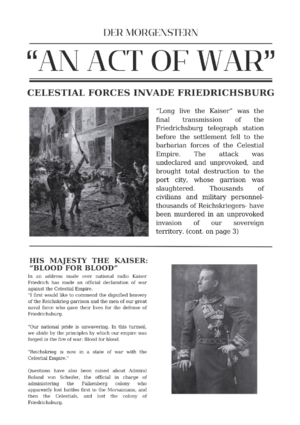Qanteng War
| Qanteng War | |||||
|---|---|---|---|---|---|
| |||||
| Belligerents | |||||
| Celestial Empire | Reichskrieg | ||||
The Qanteng War, also known as the Reichskrieger-Celestial War was a conflict between the Empire of Reichskrieg and The Celestial Empire, over the former's colonies in the Celestial Empire. It came on the heels of the Coup of January 14 and the subsequent Celestial Interregnum which rocked the crumbling Celestial Empire. Notably, this conflict marked the accelerated decline of the Celestial Empire, which had until then stood for five centuries under the unwavering rule of the god-emperor Ren Osarrus and his twenty-three successors both born and reincarnated. The province of Elodia launched an invasion into the port of Friedrichsburg, then held by the Reichskrieger colony of Falkenberg, failing to notify or seek approval from the imperial government before doing so.
Situation before the war
The Celestial Empire had entered the 20th century in a particularly dire state. Its wars with the great powers of Valmere several decades ago had kneecapped the empire and on the Celestial borders, smugglers from Dayan imported a narcotic from the vast empire called D'yavod to sell to the Celestial citizens for profit, causing a drug epidemic. Elsewhere, subjects of the Empire began to whisper of rebellion, and conspiracies brewed among Ren Osarrus XXIV's advisors, most of whom wished to take power for themselves.
In January of 1910, Grand Admiral James Gong launched a coup. His military forces overtook the imperial capital of Nhasa, while his men murdered Ren Osarrus XXIV and massacred the Imperial Diet. With virtually no obstacles to his usurpation of the throne left, Gong declared himself the acting regent of the Celestial Empire.
However, Gong's regency was short-lived and would be marked with disaster. In mid-1910, Gong lost much of the imperial treasury when he sent the ship "Aftalia" on a diplomatic mission to the great powers in Valmere, hoping to solidify power. However, the Aftalia was lost in a storm with the majority of its passengers, and a large portion of the empire's wealth was lost to the sea.
Concurrently, the province of Kalquen staged a rebellion, overthrowing and executing the imperial governor. Gong failed to put down, or even address at all, this insurrection.
In November of 1910, Gong visited the city of Falkenberg, which had recently been captured by the forces of Reichskrieg and turned into yet another colony. There, he made a highly-controversial deal with the then-governor of Falkenberg, Admiral Roland von Scheifer, to obtain several dozen Reichskrieger artillery pieces in exchange for Falkenberg's annexation of Qanteng, a port to the north of Nhasa and adjacent to the province of Luhai.
Gong would then declare himself to be Ren Osarrus XXV. This move would not earn him recognition from the Empire.
In January of 1910, Gong's reign came to an end when a multi-province coalition invaded the capital of Nhasa. Gong was killed in the fighting, and a provisional government was established. At the same time, Admiral von Scheifer of Falkenberg invaded the province of Luhai seeking to take it as another colony. This sparked the Luhai Crisis, which resulted in Falkenberg's expulsion from the province and yet more foreign intervention from the powers of Morsain and Great Tarst.
After the crisis, the imperial province of Elodia saw fit to take the port of Qanteng, now named Friedrichsburg.
War begins
On January 16, 1911, Elodian forces began shelling the port of Friedrichsburg, commencing hostilities with the colony of Falkenberg. Thus the Battle of Qanteng commenced. This military campaign also illuminated the disunity of the Celestial Empire, as the province of Swarzia declared war on Elodia in turn, their reasoning being that Elodia's actions would provoke a war with Reichskrieg.
It is claimed that contrary to common belief, several rogue Elodian artillery brigades shelled Friedrichsburg without official approval, and thus caused the battle and the war.
The Battle of Qanteng lasted a day, and the result was the massacre of the Reichskrieger garrison stationed there, and substantial civilian and military casualties for both sides. The city was almost completely destroyed in the fighting.
News reached Reichskrieg some hours later, as the Qanteng telegraph station was able to relay the information to their homeland before they were overrun.
Upon receiving news of the invasion, the Reichskrieger public erupted in outrage at the incident, and demanded war with the Celestial Empire as a whole. Their demands were met as Kaiser Friedrich VI made an address over the national radio, declaring war on the Celestial Empire.
Soon after, on the 19th of January, Vice Admiral Felix Katzfeld of Reichskrieg was sent to the colony of Falkenberg. Upon arrival, he stripped Roland von Scheifer of his command and took charge of the war effort, as Reichskrieger troops and ships began arriving in great force. Von Scheifer would be forced to return to the homeland and be reassigned to another command elsewhere.
Meanwhile, the rest of the foreign powers- Alstin, Great Tarst, Morsain, et cetera- met in Great Tarst the following month to discuss the crisis with the Celestial Empire.
The Swarzian Blunder
Swarzia, in an attempt to prevent Elodia from taking Friedrichsburg, had marched its army north to Nhasa as fast as possible. Only, they were stopped halfway to learn that Friedrichsburg had fallen, and were informed some days later that Reichskrieg had, in fact, declared war.
In perhaps a rather foolish move, the Swarzian commanders opted to march their army back home, something which would greatly hamper their preparedness for the upcoming conflict. This was also exacerbated by the rollout and distribution of the Mannstein Needle Gun, the newest infantry weapon that the Swarzians would press into service. As a majority of Swarzian infantrymen used breech-loading muskets they wound up being unable to use the Needle Gun to its fullest potential.
e
